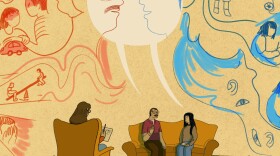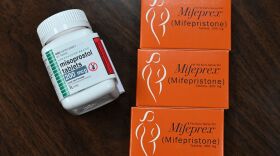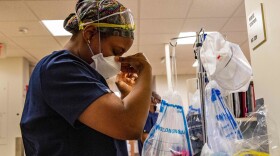
Carrie Feibel
Carrie Feibel is a senior editor on NPR's Science Desk, focusing on health care. She runs the NPR side of a joint reporting partnership with Kaiser Health News, which includes 30 journalists based at public radio stations across the country.
Previously, Feibel was KQED's health editor in San Francisco and the health and science reporter at Houston Public Radio. She has covered abortion policy and politics, the Affordable Care Act, the medical risks of rodeo, the hippie roots of the country's first "free clinic" and the evolution of drug education in the age of legal weed.
Feibel graduated from Cornell University and has a master's degree in journalism from Columbia University. In her print career, she worked at The (Bergen) Record and the Herald News in New Jersey, the Houston Chronicle and the Associated Press. She is currently a board member of the Association of Health Care Journalists.
Feibel was part of the coverage of Hurricane Ike, for which the Houston Chronicle was named a Pulitzer Prize finalist. At KQED, she edited a half-hour radio show on U.S. refugee policy that won an award in explanatory journalism from the Society of Professional Journalists.
-
Relatives of overdose victims felt uncertainty and frustration after the Supreme Court overturned a controversial settlement with Purdue. It could delay funds for communities battling addiction.
-
Plenty of people go to couples therapy — why not siblings therapy? Experts say the long, complicated relationships between siblings are worth exploring and tending to.
-
The footage of humpback whales exfoliating their skin with sand offer new insight into these animals' complex lifestyles deep beneath the ocean
-
Democratic leaders in California and Oregon are becoming more open to using involuntary psychiatric commitment to combat homelessness, drug abuse and untreated mental illness.
-
New, untested abortion bans have made doctors unsure about treating some pregnancy complications. That's led to life-threatening delays, and trapped families in a limbo of grief and helplessness.
-
Pharmacists refusing to fill prescriptions for medications used for abortion could be violating civil rights law. The meds are also used to treat miscarriages, arthritis and ulcers.
-
There are more patients and, in some places, not enough health care workers to go around. Research shows the crowding will impact care and increase mortality for all patients.
-
The Texas law bans abortions after a "fetal heartbeat" is detected, usually about six weeks into pregnancy. But doctors say that's not an actual medical term and it's being used inaccurately.
-
COVID-19 has now killed more Americans than WWII. That fact helps some people put the viral death toll in perspective, while others find it offensive. Historically, is it even a valid comparison?
-
Last spring, nurses and doctors traveled to New York and other COVID hot spots to help overwhelmed hospitals. But with the virus spreading everywhere, hospitals now have nowhere to turn for help.










